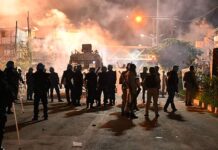There has been some rhetoric from BJP leaders relating to Bangladesh that has not gone down well
As India’s polling marathon for the 16th Lok Sabha enters into the last three laps, and voters have been swarming the polling centres in increasing numbers, one point being discussed in depth is – should India’s neighbours become wary if there is a change in government in Delhi?
It is now felt that a Congress-led government is unlikely to get a third term in office, and the likelihood is that either a BJP-led alliance would sweep to power, or a non-BJP and non-Congress government could be stitched up with the regional parties (with or without the support of the Congress Party) to take charge in Delhi.
It is usually seen that the basic tenets of India’s foreign policy do not undergo a wholesale change with a change of government – national interests take precedence over party ideologies. The country’s national security comes before everything else.
Political observers feel that in case of a non-Congress and also a non-BJP government ie a Third Front taking control in Delhi, where Congress may also join up, they would follow the existing policy regarding India’s neighbouring countries. The neighbours in that case need not have sleepless nights.
But, if the Modi juggernaut moving across the country catches the people’s imagination and a BJP-led government is formed, the scenario takes a different turn. If, for example, Modi has to take the support of Jayalalitha in Tamil Nadu and Mamata Banerjee in West Bengal, he would try to bring in the states as partners in the execution of the country’s foreign policy. The reason behind such a move is that the Centre’s hand is seen to be weakened by conceding veto to the states, as has been evident in the past in the cases of both Tamil Nadu and West Bengal.
If, however, Modi does not require the support of the other parties and the BJP-led alliance bags the magical number of seats of 272 or more, political analysts believe there could be changes and the neighbours would need to keep a close watch on Modi’s moves.
In its election manifesto, Hindu nationalist, BJP emphasises on the need to restore a resurgent India to its “rightful place in the comity of nations” and raises the idea of taking a “strong stand and steps” in the neighbourhood, if necessary. BJP also says there will be “zero tolerance” of terrorism and extremism.
In a recent interview, Narendra Modi said: “I believe in Hindutva, which is based on the age-old concept of ‘Vasudeva Kutumba.’ I believe mutual respect for one another and cooperation should be the basis for relationships with foreign nations. I will follow the policies of the Vajpayee-led NDA government … And I don’t think a decision taken by any individual or one event should impact the overall policy.”
While very strongly maintaining that he would be pursuing the policies that Atal Bihari Vajpayee’s NDA alliance had followed, Modi has also said in no uncertain terms that he appreciated Vajpayee’s ability to project strength and preserve peace.
There is, however, a vast difference between the political acumen of Atal Behari Vajpayee and that of Narendra Modi. Vajpayee showed his statesmanship and farsightedness in pursuing his country’s relationship with Pakistan. He very efficiently conducted the “Lahore bus diplomacy” and did not budge in going into war with Pakistan over Kargil. Pragmatic, Modi might be, but he is yet to attain the stature required of the leader of a country that is termed as an emerging world power.
Looking at some of India’s neighbours and Modi’s comments, the BJP prime ministerial candidate, in an election speech recently has warned China to shed its “mindset of expansionism” and in the past, he has talked tough against Pakistan for attacks by militants in India.
Narendra Modi’s advisers have already said that India will get tougher on territorial disputes with China and in its old rivalry with Pakistan if he becomes the prime minister in May after a general election. In general, BJP is seen as tougher on the issue of terrorism traced to Pakistan.
But, it must also be borne in mind that as chief minister of the state of Gujarat for more than a decade, Modi has often sought investment from China and has a record of pursuing close commercial ties with its northern neighbour. Modi would, therefore, have to do a balancing act by defending India’s security interests on the one hand and growing business links with the world’s second-biggest economy on the other.
As regards Bangladesh, there is a perception that a Congress-led government in India usually maintains a good relationship with Bangladesh when Awami League is in power. There is a historic perspective to it. But, it has also been seen that when these two parties are in power in their respective countries, many issues remain unresolved. The two main unsettled issues between the two countries now relate to Teesta and Land Boundary Agreement, including the enclaves.
It has also been seen that during the last AL-led government in Bangladesh when Atal Bihari Vajpayee was the Indian prime minister, relations between the two countries were cordial. There was that gruesome incident at Padua, when many people died in a border skirmish and horrific pictures were published in the newspapers in Bangladesh. However, it did not take long for the two sides to sit across the table and bring an end to their differences. The Ganges water sharing agreement was also renewed during the rule of the last BJP-led government in India.
However, there has been some election-time rhetoric from BJP leaders relating to Bangladesh in the recent past and that has not gone down very well, with justification, among the common people here. One might say that these have no bearing on the foreign policy to be pursued by India, but these do create a dangerous precedent and also ill-feelings in the minds of people.
As one political analyst said recently: “Poll rhetoric is one thing and statesmanship is something else.”
It is widely felt that Narendra Modi, unlike Vajpayee, is not a man of the world. Modi as prime minister of India would mean a RSS takeover, or certainly Hindu fundamentalist takeover. There is a feeling that they would take up the Bangladeshi immigrants issue very strongly.
The problem relating to river water-sharing between India and Bangladesh would need the help of the concerned state governments. If the state governments are non-BJP non-allies, then finding solutions would be even more complex.
As regards Indian foreign policy outline and relations with its neighbours, we have so far seen a broad consensus, irrespective of which party comes to power. But things have changed in this election campaign.
As one of Narendra Modi’s aides recently said: “This time, if there is a change in government, I do expect a break from that tradition.”
Source: Dhaka Tribune










